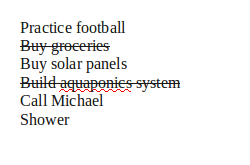Backlogging means creating a list of things you need to do. Backlogging is required when you define sustainability projects like solar power towers. However, the backlog definition also fits for everyday “projects” like getting your groceries. In the following I will explain how to efficiently create backlogs of any kind. Actually, you will not only be able to create a clear backlog in minimum time, you can also use the same method for creating your paleo shopping list, ironman packing list, spring break packing list, music festival packing list or any other list that helps you not to forget anything.
The main idea is to create a complete list of each type first. For backlogging this means for example that you write down everything that you might need to do regularly. If there is a new backlog item, you always add it to the general list, not only to your daily backlogs. If you plan your next day or week, you simply copy your complete list, add any one-time backlog items (e.g. calendar items), and then delete all backlog items that are irrelevant for the day. This might sound like a lot of work, but usually it is much faster to delete all backlog items that you don’t need than to think of all backlog items that you need. And using the complete list makes it also less likely that you forget anything.

You can use the same method when you go to the shopping center – whether you buy solar panels or another sustainable system component, or just your groceries. The method can also be used to create the universal packing list that you can then use to create your ironman packing list, spring break packing list, music festival packing list, college packing list or holiday packing list.
For backlogging, packing list definition or shopping list definition I usually prefer to simply create text files. There might be some disadvantages compared to the best shopping list app or backlogging software, but using text files is extremely versatile. You can read and edit them on almost any device, you can copy them to your calendar, you can safe them in your cloud (e.g. using Dropbox), but you will also have them available, if you don’t have an Internet connection.
I hope this information will help you with organising your life, be it for implementing your sustainability projects or for anything else. Sign up now to get more useful information about solar energy and sustainable systems and other hints that could improve your life significantly.
